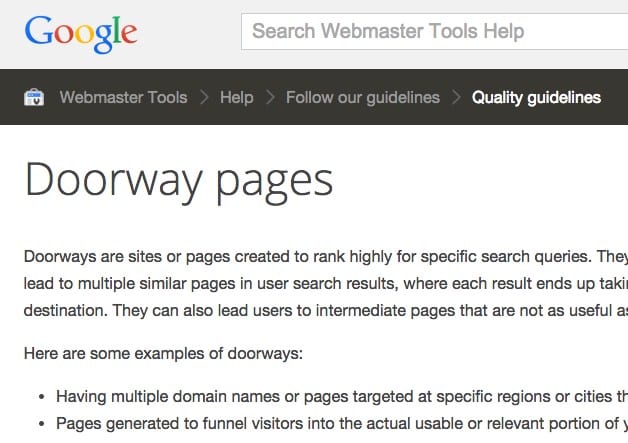Will this be Google's biggest algorithm update of the year so far?
Importance: [rating=4]
Recommended link: Google’s official announcement - ‘An update on Doorway pages’
Wow, this seems a strange one! It feels like back to the 1990s when Doorway pages were a common SEO technique to get ranked in Altavista which was popular before Google even launched. When Google launched in 1998, their push to create more relevant results soon saw them outlaw Doorway pages and issue webmasters guidance to avoid them. So a definite sense of Déjà vu for me and many other search marketers I’m sure!
I’ve rated this alert as 4 out of 5 since although this webspam penalty is clearly aimed at targeting SEO spammers, there is always the risk of false positives from companies who are looking to practice ethical SEO. Google has issued a warning on their Webmasters Tools blog and updated their definition of doorway pages, so it's worth getting familiar with their definition of a doorway page to see whether your business could be a 'false positive' and keeping a careful eye on organic traffic levels to different types of pages across your site in analytics in the weeks ahead.

What marketers need to know about The Doorway page update
- 1. You need to understand what a doorway page is and isn’t. Traditionally, a doorway page was a page specifically created to target a limited number of keywords (or even separate search engines) which then led to other content elsewhere in a site. To understand this update you need to understand Google’s current definition of doorway pages.Here is Google’s full definition of Doorway pages which has recently been updated in their help system:
“Doorways are sites or pages created to rank highly for specific search queries. They are bad for users because they can lead to multiple similar pages in user search results, where each result ends up taking the user to essentially the same destination. They can also lead users to intermediate pages that are not as useful as the final destination”.
For false positives, I’m concerned about this part of the definition .
“...sites or pages created to rank highly for specific search queries”. The question here is how does this type of page differ from a category page deliberately optimised for SEO which aims to get visitors on to other product or content pages?
Here are some examples of doorway page practices given by Google to help explain it:
- Having multiple domain names or pages targeted at specific regions or cities that funnel users to one page
- Pages generated to funnel visitors into the actual usable or relevant portion of your sites
- Substantially similar pages that are closer to search results than a clearly defined, browseable hierarchy”
So, reading between the lines, pages which could get a penalty are: Pages that link to other parts of the site using a list, with little other content to add value through additional content; Pages that are not part of a hierarchy - which can be the case with AdWords landing pages.
Google seems likely to use similar signals to Panda for 'thin content' that show that users are not engaging with these pages including low dwell time or even low levels of links or social shares. Indeed Google specifically mentions Doorway pages in its update page discussing manual penalties for pages with thin content or no added value.
- 2. The doorway page approach may be part of other sites. The announcement specifically mentions affiliates and separate domains, so it seems this could be targeted specifically at affiliates (who of course indirectly compete with Google AdWords).
- 3. Landing pages targeting local search results may be at risk. The new definition of doorway pages specifically calls these out. It's quite common still to see boilerplate pages with auto-generated keywords which are 'doorway pages' for local businesses with a national network, e.g. car rental, however, they usually provide relevant content on the page, so should be legit. As has been pointed out in Local Search Forum, Google uses a similar approach in their 'Get Your Business Online' campaign.
- 4. Update Coming real soon now’. This is likely a change to watch for over the next few weeks rather than days judging by the long warning about Google SEO Google’s official turn of phrase is “we’ll soon launch a ranking adjustment. which doesn’t give much to go on/
- 5. There is no ‘cool’ name for this update (yet) - I think it will probably remain the "Doorway Page update’ - no other name necessary surely - works better than Pigeon or Hummingbird.
How do you see this update - do you think there is a risk of false positives? Which other types of legit pages could be harmed, e.g. on Ecommerce sites?







